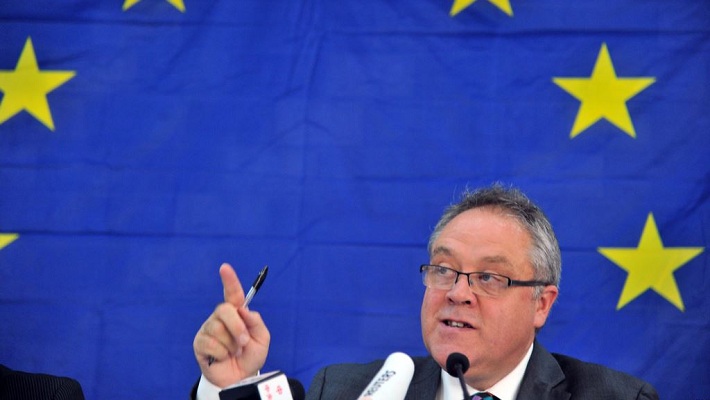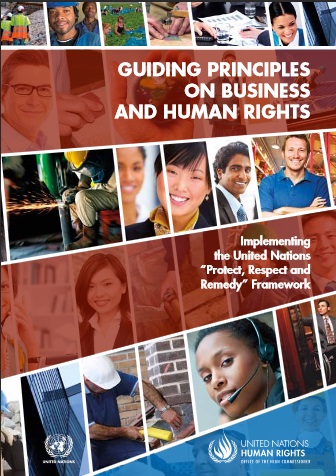Oliver Balch finds out why a former thorn in the flesh of EU Inc, who played a central role in pushing through the non-financial reporting directive, quit politics to head up the International Integrated Reporting Council
‘There is no such thing as keeping out of politics.’ So claimed George Orwell more than half a century ago. Today, Richard Howitt is doing his best to prove his fellow socialist wrong.
After more than 20 years as an elected member of the European Parliament, the long-term MEP for the East of England has left his law-making days behind him to take up leadership of the International Integrated Reporting Council (IIRC), a global coalition of regulators, investors, companies, standard setters, the accounting profession and NGOs.

Compared to the corridors of power in Brussels, life at the IIRC marks an indisputable break with the past. Run out of a small London office, the pro-business charity has a mere 31 full-time staff and a modest annual budget.
Doesn’t he miss the cut-and-thrust of politics? Not a bit of it, apparently. Although he insists that the is “very proud” of what he achieved as an elected political, he is now fully invested in his new job.
The Cambridge-based former MEP isn’t the first of his ilk to have experienced an unexpected career change in recent months. The UK’s decision to leave the European Union early next year has left many British MEPs looking for their own private exit from the EU project.
His 20-year-old self would never have imagined that, at 56, he would be jetting off to Davos as head of an international, business-friendly organisation
A convinced Remain advocate, Howitt doesn’t hide his disappointment at the turn the 2016 Brexit referendum took. Whichever way the vote had gone, however, he insists that he was already set on resigning.
Prior to the referendum, his friend and co-promoter of corporate disclosure, Paul Druckman, had let it be known that he intended to retire as the IIRC’s inaugural chief executive.
As the name suggests, the IIRC was set up in 2010 to promote the integration of social, environmental and governance data alongside financial information in companies’ accounts. It’s a mission that Howitt describes as “too precious” and “too important” to be allowed to falter. “So I allowed my name to go forward, and that's where I've ended up,” he remarks.
His 20-year-old self would never have imagined that, at 56, he would be jetting off to Davos and to G20 meetings as head of an international, business-friendly organisation. It’s not the standard trajectory of a boy from a council flat in Reading, brought up by a single-mum who worked in a pub, he admits. But then nor was becoming an MEP.

The bigger shift would appear to be in his private politics. A dyed-in-the-wool Labourite, he first sharpened his political elbows as a local councillor in Harlow, Essex. From 1994 and 2016, meanwhile, he served as a member of the UK Labour Party's National Policy Forum.
His political agenda on becoming an MEP followed a similar course. As a decade-long member of the Socialist Group in the European Parliament, he took on a host of left-wing causes. The list spans fighting against zero-hour contracts and defending rights for disabled workers through to campaigning for an onerous Robin Hood Tax on global banks.
The cause for which his career in Brussels is probably best known, however, relates to the issue of corporate accountability and transparency. As special rapporteur for corporate social responsibility for three successive European Parliaments, he played a central role in making non-financial reporting mandatory for the continent’s largest listed corporations.
Intense lobbying by private sector lobby groups meant the disclosure directive, which came into force in April 2014, took years to find its way to the statute book (Howitt first proposed the idea back in 1999). A last-minute intervention by then UK prime minister David Cameron saw its scope reduce from 18,000 companies to around 6,000.
Howitt is adamant he hasn’t sold out from his socialist beliefs. Nor has he passed through the ‘revolving door’ to land a cushy job on the other side
So what happened to persuade this thorn in the flesh for EU Inc to join a pro-business coalition like the IIRC?
Howitt is adamant on two points. First, this isn’t a case of him selling out. Second, this isn’t about him passing through the “revolving door” and landing a cushy job on the other side.
While his politics on social and environmental matters have always been firmly of the left. his economic views have always been broadly pro neoliberal.
“I was very keen never to be seen as part of anti-globalisation or anti-business,” Howitt says. “That was a complete cul-de-sac for campaigners who argued that.”
Moreover, he sees a direct link between his present advocacy for integrated reporting and the social and environmental campaigns he pursued while in Brussels.

Compelling companies to reveal their policies and risks on climate change, corruption, human rights and such like as an MEP was never meant as a stick-in-the-eye for big business.
While a strong proponent of tougher ethical standards for business, the promotion of non-financial disclosure was primarily about getting the private sector to wake up to the big issues of the day – and, as importantly, to play their part in fixing them.
Integrated reporting can help companies “understand the connectivity” between climate change, social unrest, technological advancement and so forth, he reasons. More than that, it can help companies translate such interconnection into “business language” that they can then act on.
“It [integrated reporting] enables businesses to understand how these wider factors impact on value creation for the business . . . It is about saying that the world is changing and that businesses are absolutely impacted by that.”
Businesses will do things, but they'll do things reluctantly to the minimum level
As chief executive of IIRC, his main focus is on advancing the case for integrated reporting as widely and as convincingly as he can.
His strategy for doing so? Surprisingly for a former lawmaker, his answer doesn’t involve regulation. In sharp contrast to his earlier self, he now believes laws can hinder as much as help.
“The reason in the IIRC that we don't say regulation alone [is the answer] is because it stops people thinking. It's just the compliance mentality. Businesses will do things, but they'll do things reluctantly to the minimum level, and it won't actually be part of their thinking.”

For the new IIRC head, encouraging companies to adopt “integrative thinking” when it comes to today’s major sustainability challenges is the ultimate goal. Integrated reporting is, in this context, a means of achieving such a shift in mindset.
He also thinks the term “non-financial” is an unhelpful misnomer. In Howitt’s book, issues such as climate change, water scarcity and other core sustainability concerns all carry a price tag for companies.
Fortunately for Howitt, he is not starting from point zero in his mission to mainstream integrated reporting. Today, more than 1,600 companies worldwide (most of them large corporations) publish annual reports that include sustainability and economic data side by side.
Nothing slows down a new standard than another standard that is almost, but not quite, the same
The movement also has the support of a dozen or so influential stock exchanges, including Brazil’s Bovespa and the Johannesburg Stock Exchange in South Africa.
Accelerating this depends on various factors. Top of the list is harmonisation. Nothing slows down a new standard than another standard that is almost, but not quite, the same.
Howitt concedes that alignment on a unified set of clear criteria “won’t happen in one day or one year”. But he is confident that IIRC’s consultative, partnership-based approach provides a “very clear process” that will eventually deliver the goods.
That confidence is partly based on the fact that, under the umbrella of the independent Corporate Reporting Dialogue initiative, all the main standard setters and framework developers are in regular, constructive conversation with one another.
Helping here is IIRC’s collaborative ethos, according to Howitt: “The [IIRC] framework is a very important vehicle for that [harmonisation] because it establishes the principles, but it's not just about saying that the framework has got all the answers exactly as it exists today.”
Howitt also takes heart from input from outside the reporting and accountancy world. He cites the decision by the influential United Nations Conference on Trade and Development to set up an Inter-government Working Party on Corporate Reporting.

“It is less talked about or written about, but it’s a very, very important route into how we can actually change the whole corporate reporting system in the world,” he comments.
This kind of co-operative approach is one that he became accustomed to during his time as an MEP, where, among other initiatives, he contributed to the multi-stakeholder process behind the landmark UN Guiding Principles on Business and Human Rights.
A belief in the power of persuasion and sound argument is another of his core beliefs. IIRC is currently formalising an academic network to facilitate greater collaboration and exchange between researchers, which Howitt hopes will further strengthen the business case for integrated reporting. The IIRC will launch an online database containing 300 academic papers at its annual conference in Japan later this month.
“They show that companies that do integrated reporting have a longer term investor base, have a lower cost of capital, and have a higher share price.”
From the outside, Howitt’s speedy command of business terms and corporate thinking give weight to his claim to have left politics behind. But, in truth, he remains profoundly political.

Improving understanding between different cultures, strengthening international co-operation, “building a better world”: these remain the ideas that drive him.
“And I think those ideas are under particular threat at the moment. I think in a small way, the integrated reporting movement and coalition is part of trying to solve those problems.”
Howitt may no longer be fighting in the European Parliament for the causes that he believes in, but he is very definitely still fighting.
CV: Richard Howitt
Chief Executive Officer, International Integrated Reporting Council
Nov 2016 – present
Member of the European Parliament
June 1994 – Nov 2016
Local Councillor, Harlow District Council
1983 – 1995
Disability rights worker
1986 – 1994
Volunteer organiser
1982 – 1986
Richard Howitt will be speaking at Ethical Corporation's Responsible Business Summit New York on 26-27 March.
Oliver Balch EU European Union corporate human rights IIRC Brexit Richard Howitt ESG corporate reporting PLP
